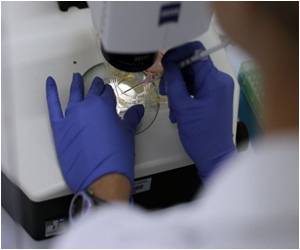A new drug target - a receptor in the nervous system - that may be key to prevent the onset of epilepsy after a prolonged period of seizures has been discovered by scientists.

Conventional therapies to treat epilepsy address the disease's symptoms by trying to reduce the likelihood of having a seizure. However, many people with temporal lobe epilepsy still have seizures despite taking these drugs.
Retrospective studies of people with severe temporal lobe epilepsy reveal that many of them initially have an episode of prolonged seizures, known as status epilepticus. Status epilepticus is often followed by a period of seizure-free recovery before people start to experience recurring temporal lobe seizures.
In animal studies, inducing status epilepticus in an otherwise healthy animal can cause them to become epileptic. The prolonged seizures in status epilepticus are therefore thought to cause or importantly contribute to the development of epilepsy in humans.
"An important goal of this field has been to identify the molecular mechanism by which status epilepticus transforms a brain from normal to epileptic," said study author James O. McNamara, M.D., professor of neurobiology at Duke Medicine.
"Understanding that mechanism in molecular terms would provide a target with which one could intervene pharmacologically, perhaps to prevent an individual from becoming epileptic."
Advertisement
Using an approach combining chemistry and genetic analyses, the researchers studied normal and genetically altered mice. The genetically altered mice were unique in that a drug, 1NMPP1, inhibited TrkB in their brains. If the drug stopped the genetically altered mice from becoming epileptic, this genetic approach would prove that inhibiting TrkB prevents the onset of epilepsy.
"This demonstrated that it is possible to intervene following status epilepticus and prevent the animal from becoming epileptic," McNamara said.
Importantly, the researchers only administered treatment with 1NMPP1 for two weeks, which was sufficient to prevent epilepsy from developing in the mice when tested many weeks later. The results suggest that a preventive therapy may only need to be given for a limited period of time following the initial bout of prolonged seizures, not an individual's entire life, which could prevent unnecessary side effects that come with long-term use of drugs.
In future studies, the researchers hope to determine the exact time window in which TrkB signaling needs to be repressed to prevent the onset of epilepsy. Long term, this research provides a molecular target for developing the first drugs to prevent epilepsy.
The study was recently published in the journal Neuron.
Source-ANI











